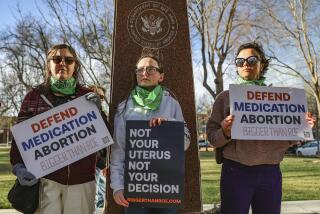Surrogates Support Baby M Ruling : Association Terms Whitehead ‘Atypical,’ Backs Judge
- Share via
Casting a short, 29-page dissent into a rising tide of argument, the Los Angeles-based National Assn. of Surrogate Mothers has joined the complicated moral, biotechnological and legal fray surrounding the celebrated Baby M case, the ground-breaking test of surrogate parenting tried earlier this year in a New Jersey court and now on appeal to that state’s Supreme Court.
The 65-member group is the first to file a friend-of-the-court brief in favor of last March’s decision upholding the contract that produced Baby M, said the association’s Beverly Hills attorney, William W. Handel, a specialist in reproductive law and also director of the Center for Surrogate Parenting.
“A woman has the right to do with her body as she chooses,” Handel said, summing up the arguments made in the brief.
Other Briefs Opposed
About 17 other briefs filed in the case have all opposed the decision of New Jersey Superior Court Judge Harvey R. Sorkow, which stripped Baby M’s surrogate mother, Mary Beth Whitehead, of all legal parental rights, Handel said. The decision was the first on the legality of surrogate parenting contracts. After a bitter, three-month trial, the judge awarded sole custody to Baby M’s father and his wife, William and Elizabeth Stern, denying Whitehead’s request to keep the child which she had agreed to bear. However, in a ruling a few days after the trial, the New Jersey Supreme Court awarded Whitehead the right to visit the child.
In its brief, the surrogate mothers association argues, among other things, that Whitehead, who was to have been paid $10,000 to conceive and bear a child created from her ovum and the father’s sperm, is “atypical of the average surrogate mother.” In announcing his decision, the judge characterized Whitehead, who has two children of her own, as “manipulative, impulsive and exploitative.”
The brief also claims that “the average surrogate mother is 26 years old, white, Christian, married and has two children. She has a high school diploma, is self-supporting or within a self-supporting family and above the poverty level.” Whitehead is a high school dropout, has been on welfare and has been separated from her husband, courtroom testimony revealed.
In a telephone interview, Handel maintained that Whitehead is “a real aberration” and that surrogate mothers, who have borne about 600 babies in the United States, have changed their minds and tried to retain the babies only four times.
In the brief itself, Handel argues that “the right to privacy and procreation logically extend to include the right of a couple to engage a third party (the surrogate) as part of the process of reproduction.”
Other briefs filed in the case ask the state Supreme Court to invalidate the contract between the Sterns and Whitehead. The most widely publicized such brief was signed by 22 prominent feminists, including Gloria Steinem and Betty Freidan. The group charged that court backing of surrogacy agreements “promotes baby-selling,” permits “an elite economic class to exploit a poorer group as breeders” and opens “the floodgates to commercialization” of emerging reproductive technologies.
Handel said the surrogate mothers represented by him were “amazed” by the feminists’ stand against surrogate parenting, which seems at odds with feminist positions on other issues related to women’s freedom of choice.
But Handel said he is optimistic that no matter which way the New Jersey court rules in a decision expected next month, surrogate parenting will continue.
“I think the worst they (the court) can do is hold the contract unenforceable, which is not going to stop surrogate parenting,” he said.
More to Read
Sign up for Essential California
The most important California stories and recommendations in your inbox every morning.
You may occasionally receive promotional content from the Los Angeles Times.













